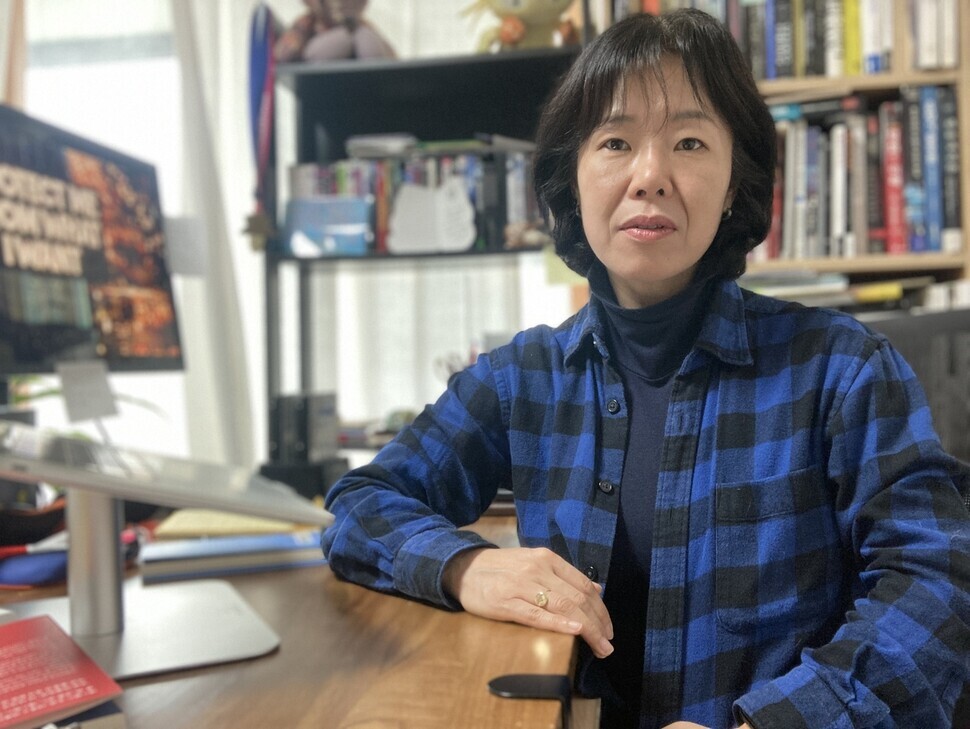hankyoreh
Links to other country sites 다른 나라 사이트 링크
[Interview] Inside the web that entraps Filipinas in sexual exploitation for US troops in Korea

We must ask ourselves, why is it that so many poverty-stricken women are subject to such bad luck?
On Nov. 26, 2023, the UN Committee on the Elimination of Discrimination against Women, known as CEDAW, concluded that the South Korean government should provide full reparation to three Filipino women for failing to protect their human rights, treating them as criminals, and engaging in secondary victimization of the women.
While the UN’s conclusion is fairly recent, this problem is a recurring one in South Korea.
Documentary filmmaker Lee Ko-woon has explored the structure of the industry that sex-trafficks Filipinas into foreigners-only clubs near US military bases in her 2016 documentary “Host Nation.”
The documentary examines how managers in the Philippines, Korean nightclub owners, and Korean brokers trap young, impoverished Filipino women within the context of US military bases.
The Hankyoreh sat down with Lee on Feb. 28, to discuss the recent UN recommendations.
Cornering women into sex slave contracts with debt
Hankyoreh: You got an up-close look at the lives of Filipino women who have been sexually victimized and exploited in Gunsan, North Jeolla Province, and Gyeonggi Province’s Dongducheon, Pyeongtaek, and Songtan. How did you gain access to clubs and Filipino locales hidden from the public eye?
Lee: When we were filming the documentary, the “juicy girl” issue came to the forefront. The US State Department referred to the practice as human trafficking. Military authorities started explicitly telling soldiers to stop visiting such establishments. A commander at Kunsan Air Base issued a ban on troops visiting “juice bar” establishments. Club owners were seeing their bottom lines shrivel up. It was at this point that one of them started raising his voice. Club owners had a tacit agreement with US forces, forming an underbelly network that sustained their businesses. But now the US had turned their backs on them, calling them criminals and the main beneficiaries of the business.
The club owners also protested the labeling of Filipino women as pure victims. “Just look at them when they go back to the Philippines, and see what kind of trade they take up. And then tell me that they’re innocent victims,” they’d say. They probably didn’t think I’d take their suggestion to heart. I went to the Philippines, and contacted a club owner, asking for a connection to a local manager or broker. He seemed surprised. For a month, I stayed in communal lodgings with the Filipino women run by the manager.
Hankyoreh: What was it like when you went there? Were the club owners right?
Lee: The US State Department issued a report calling the practice human trafficking. Human trafficking isn’t limited to overt violence, kidnapping and confinement. It often involves manipulating someone who is young and naive — whether it be through pressure or lies — and straddling them with debt. The debt becomes a trap that forces them into prostitution. That is another form of human trafficking. You create a system where brokers, managers and club owners can filch from their monthly salaries — one where the victims cannot run away even if they want to. That’s the crux of modern human trafficking. It’s more sophisticated than simple kidnapping and force. And it’s more complex than the issue of whether or not the victims knew about the nature of the work they were being pressured into.
Regarding the question of whether or not the women knew they were going into sex work, the answers fall within a wide spectrum. There are a lot of people in the Philippines who actually go to foreign bars, clubs, hotels, ferries, and tourist hotspots as waitresses who serve drinks and sing. So it is possible that some women have this type of work in mind when offered jobs. At the same time, some are aware that they’ll be working in the sex trade when they come. But that awareness does not change the fact that they are victims. From their first day on the job, many club owners and their acquaintances sexually assault the women as a form of training. Some of the women endure unspeakable things when in a room alone with clients.
It’s still human trafficking, even if the women know what they’re getting into

Hankyoreh: Some people would say that the women made the individual choice to go into sex work.
Lee: For every person, there are always various options when it comes to making money. Some options loom larger than others. If someone is presented with a wide breadth of choices from a young age, it’s rare for them to make overtly harmful choices. Yet if someone grows up in a poor environment, where their family is struggling, and they’re young, and someone tells them, “You can make money by just singing at a club,” what are they going to say? Why is it that such a fortune befalls more impoverished women than women who are well-off? For a girl in that situation to say “no,” when most of her peers are saying “yes,” requires more willpower and foresight than the average person. In other words, that type of girl is rare.
Hankyoreh: What is at the core of the Filipino sex industry?
Lee: The industry’s foundation is women in poverty. When we say poverty in a place like the Philippines, we’re talking about households with multiple children, where parents can’t even feed them all. The families that managed to get rich during the colonial period have passed down their wealth. Even men who manage to graduate from university have a hard time getting good jobs. Relatives and families often pool their labor together to survive, and the women often serve a critical role by getting jobs overseas. Filipino culture is a unique blend of indigenous matriarchal and tribal conventions mixed with Catholicism. Abortions are strictly forbidden, and children are always hailed as a blessing. It’s common for women to go out in search of work while the grandmothers and aunties raise the children at home.
We must consider the financial and mental or emotional debt that ensnare women before they even set foot on Korean soil. A manager will take a penniless girl off the streets, put a roof over her head, give her a hot meal, take a quick video of her singing, get her a Korean visa, and pay for her plane ticket to Korea. In the process of all this, however, she incurs debt. The minute she arrives in Korea, she needs to start earning immediately to repay this debt. After months of this debt trap, she can finally see the light at the end of this tunnel that will allow her to send some of her earnings to her family back in the Philippines. She thinks of her family back home, desperately waiting for a wire transfer. The emotional debt kicks in. Each time she wires money back home, she thinks, “Just a little bit more.” Until one day, she finds herself resigned to the whole situation. Sometimes, she thinks, “I can’t take this anymore,” and manages to escape or be rescued. These are the people who usually file court cases.
Hankyoreh: As clubs catering to US forces die out, how are things changing?
Lee: US soldiers were initially just replaced by migrant workers, but that line of revenue couldn’t sustain them. The club owners even appealed to local governments to get things back to the way they were. Local leaders would then allow local clients to enter the premises, citing reasons like “fostering the local economy.” Eventually, the clubs just transformed into room salons with foreign workers.
A legal hodgepodge featuring remnants of Japanese imperialism, US soldiers, and Korean democratization
Hankyoreh: What do you hope viewers will take away from your documentary?
Lee: Every law or government has its own DNA. The DNA of South Korea’s laws and government contain genetic material from Japanese imperialism, the US military, and the Korean struggle for democracy — with its various movements for civil rights and human rights. The US, when it occupies foreign countries, reverts to imperialist practices by contributing to prostitution ecosystems in the local economies. Yet they also prevent club owners from operating their businesses, citing human rights abuses. How nice. Everything is all mashed together. So what role has our own government played? That’s something we need to think about. We could point fingers while asking for government measures, but honestly, the blame is shared by everybody, which makes a clean solution difficult. Yet we shouldn’t just look at the Filipina victims from a purely pragmatic standpoint. We need to look at them from the lens of justice. That is how we face the uncomfortable genetic makeup within our DNA.
By Son Go-woon, staff reporter
Please direct questions or comments to [english@hani.co.kr]

Editorial・opinion
![[Column] Season 2 of special prosecutor probe may be coming to Korea soon [Column] Season 2 of special prosecutor probe may be coming to Korea soon](https://flexible.img.hani.co.kr/flexible/normal/500/300/imgdb/original/2024/0426/3317141030699447.jpg) [Column] Season 2 of special prosecutor probe may be coming to Korea soon
[Column] Season 2 of special prosecutor probe may be coming to Korea soon![[Column] Park Geun-hye déjà vu in Yoon Suk-yeol [Column] Park Geun-hye déjà vu in Yoon Suk-yeol](https://flexible.img.hani.co.kr/flexible/normal/500/300/imgdb/original/2024/0424/651713945113788.jpg) [Column] Park Geun-hye déjà vu in Yoon Suk-yeol
[Column] Park Geun-hye déjà vu in Yoon Suk-yeol- [Editorial] New weight of N. Korea’s nuclear threats makes dialogue all the more urgent
- [Guest essay] The real reason Korea’s new right wants to dub Rhee a founding father
- [Column] ‘Choson’: Is it time we start referring to N. Korea in its own terms?
- [Editorial] Japan’s rewriting of history with Korea has gone too far
- [Column] The president’s questionable capacity for dialogue
- [Column] Are chaebol firms just pizza pies for families to divvy up as they please?
- [Column] Has Korea, too, crossed the Rubicon on China?
- [Correspondent’s column] In Japan’s alliance with US, echoes of its past alliances with UK
Most viewed articles
- 1‘We must say no’: Seoul defense chief on Korean, USFK involvement in hypothetical Taiwan crisis
- 2[Editorial] Korea’s surprise Q1 growth requires objective assessment, not blind fanfare
- 3[Column] Season 2 of special prosecutor probe may be coming to Korea soon
- 4Division commander ordered troops to enter raging flood waters before Marine died, survivor says
- 5Is Japan about to snatch control of Line messenger from Korea’s Naver?
- 6The dream K-drama boyfriend stealing hearts and screens in Japan
- 7[Column] ‘Choson’: Is it time we start referring to N. Korea in its own terms?
- 8No good, very bad game for Korea puts it out of Olympics for first time since 1988
- 9[Special report- Part III] Curses, verbal abuse, and impossible quotas
- 10S. Korea “monitoring developments” after report of secret Chinese police station in Seoul